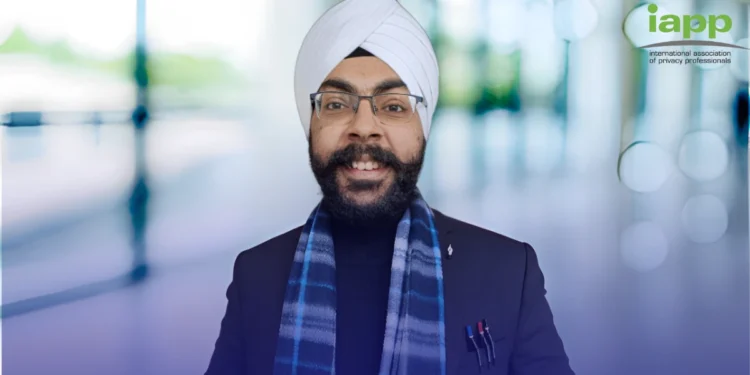In this engaging conversation, Chetandeep S. Batra shares his rich experience as a privacy consultant, DPO trainer, and Chapter Chair at IAPP New Delhi. With deep roots in risk management, compliance, and advisory, Chetandeep brings a unique blend of legal insight and technical fluency to the table. He discusses the evolving role of privacy in India under the DPDPA, the critical need for awareness across organizations, and his mission to make privacy practical and accessible. Through his authored works and community leadership, he continues to influence the privacy landscape in India with purpose and passion.
Who is Chetandeep S. Batra?
Chetandeep S. Batra is a leading voice in India’s data privacy space and currently serves as the Chapter Chair for IAPP New Delhi. With a strong legal foundation and certifications like CIPP/E and ISO 27001, he brings a unique blend of legal insight and operational expertise. As a privacy consultant, certified DPO, and speaker, he helps businesses navigate privacy laws like GDPR and DPDPA while also promoting ethical data practices. He’s also the author of six books and a committed mentor, inspiring the next generation of privacy professionals through training, writing, and community leadership.
Beyond consulting, Chetandeep is widely recognized for his practical and hands-on DPO training programs that focus on real-world application. His thought leadership is also reflected in his authorship of six books, including Cyber Detective Avantika and Data is the New Oil, aimed at spreading privacy awareness among young professionals and wider audiences. Through his IAPP Chapter Chair role, Chetandeep actively brings together the privacy community in India to elevate discussions around data protection, responsible technology, and ethical AI.
Q1. Can you tell us something about your work in the data privacy space?
Chetandeep: I’ve been fortunate to work in the data privacy space among Big 4’s across multiple domains, including compliance, risk management, and advisory. My focus has been on helping organizations build privacy frameworks that are not just compliant, but also practical and scalable. I’ve worked on everything from implementing GDPR, DPDPA, CCPA and other global requirements to guiding startups and enterprises on how to embed privacy by design into their systems. What excites me most is translating legal and regulatory language into actionable, business-friendly practices that make sense to both tech and non-tech teams. Beyond my consulting work, I’ve also authored two books—Cyber Detective Avantika and Data is the New Oil—which aim to raise awareness about the importance of data privacy and security, especially among younger audiences and emerging professionals in this space.
Q2. Can you share some insights on your DPO training programs?
Chetandeep: Absolutely. The DPO training programs I’ve been involved in are designed to be hands-on and deeply practical. We cover the regulatory frameworks like GDPR, DPDPA, and others—but more importantly, we dive into real-world scenarios like how to conduct a DPIA, performing ROPA, perpetuating gap assessments, manage data subject requests, handle breaches, and interact with regulators. A big part of our focus is on building the mindset of a DPO—not just the skillset—because it’s a role that requires both legal fluency and operational agility. We’ve also added modules around emerging tech and AI governance, which are becoming increasingly relevant.
Q3. What do you like most about DPDPA?
Chetandeep: What I really appreciate about the DPDPA is that it’s designed with a forward-looking mindset. It acknowledges India’s digital economy while trying to strike a balance between innovation and individual rights. The emphasis on consent, transparency, and accountability brings India into global conversations on privacy. I also like that it introduces a more centralized approach through the Data Protection Board, which, if implemented effectively, could bring consistency in enforcement.
Q4. What do you dislike most about DPDPA?
Chetandeep: Instead of saying I “dislike” aspects of the Digital Personal Data Protection Act (DPDPA), it’s more accurate to say there are areas that have generated significant discussion and concern. Smaller businesses might face compliance hurdles. The broad exemptions raise questions about the Act’s reach. Balancing individual rights and organizational duties is a complex challenge. The Data Protection Board’s effectiveness and independence are crucial. These points, instead of evoking negativity, represent areas needing careful consideration and implementation to ensure the DPDPA achieves its intended goals effectively.
Q5. With your experience across multiple regulations like GDPR and DPDPA, what’s the biggest challenge businesses face in global privacy compliance?
Chetandeep: The biggest challenge is navigating the patchwork of regulations without losing operational efficiency. Each law has its nuances—from lawful bases to breach notification timelines—and aligning them without overburdening the business is tough. Another challenge is cultural: getting global teams to treat privacy not just as a legal requirement, but as a shared responsibility.
Q6. What will be the detrimental factors for DPDPA to be a success?
Chetandeep: Implementation clarity and enforcement consistency will be critical. Vague guidelines, delayed rulemaking, or uneven enforcement could lead to confusion and non-compliance. Another risk is insufficient industry readiness—especially among MSMEs—if awareness and support aren’t scaled. And lastly, if exemptions are overused, it could erode public trust in the framework itself.
Q7. How does being a Chapter Chair allow you to engage with privacy professionals and influence privacy practices in India?
Chetandeep: Being a Chapter Chair gives me the platform to bring people together—policy experts, practitioners, technologists—to discuss real challenges and share insights. It allows me to host events, workshops, and mentorship circles where we can elevate privacy literacy and create a sense of community. It’s also a way to give feedback upstream—to regulators or lawmakers—based on what we hear from the ground.
Q8. Do you believe Indian businesses are prepared to take action under the DPDPA? What gaps do you observe?
Chetandeep: Larger organizations are moving in the right direction, but many mid-size and smaller businesses are just beginning their journey. The biggest gaps I see are in awareness, talent, and tooling. Many businesses still see privacy as an IT or legal issue, not a strategic one. There’s also a need for more localized guidance, especially for sectors like edtech, healthtech, and fintech.
Q9. How do you see emerging technologies like AI impacting the future of data privacy and compliance?
Chetandeep: AI is a double-edged sword. On one hand, it introduces new risks—bias, lack of explainability, unauthorized inferences. On the other, it can enhance compliance through automation, anomaly detection, and intelligent data mapping. The future will require privacy professionals to collaborate closely with AI ethicists and engineers. Regulations like the EU AI Act are setting the tone—and India will eventually need its own AI governance framework.
Q10. What are the common pitfalls companies should avoid when implementing a data protection compliance framework?
Chetandeep: A big one is treating compliance as a one-time project instead of an ongoing journey. Another is failing to involve all stakeholders—privacy can’t sit with legal or IT alone. Overengineering solutions or blindly copying frameworks without contextualizing them to your business model is also a common mistake. And lastly, ignoring employee training—people are your first line of defense.
Q11. Can you share your professional journey and how it led you to work in the field of data privacy?
Chetandeep: My journey began in cybersecurity and risk advisory, which gave me a strong foundation in controls and governance. As privacy regulations like GDPR emerged, I found myself increasingly drawn to the human and ethical side of data. I started advising clients on privacy as an extension of trust, not just regulation. Along the way, I earned my CIPP/E and ISO certifications, also a certified DPO, featured among different podcast and guest speaker sessions and even 6 authored books including Cyber Detective Avantika and Data is the New Oil to spread awareness. It’s been a deeply fulfilling path—because at its core, privacy is about respecting people.
Chetandeep S. Batra’s insights offer a clear reminder that data privacy is no longer just a legal requirement—it’s a foundational pillar of digital trust. His practical approach to privacy, combined with deep regulatory knowledge and a passion for awareness, makes him a guiding voice in India’s evolving data protection ecosystem. As India navigates the implementation of DPDPA, professionals like Chetandeep play a crucial role in helping organizations move from compliance to confidence. His journey, marked by leadership, education, and advocacy, is both inspiring and instructive for anyone committed to responsible data governance in the age of AI and rapid digital transformation.










